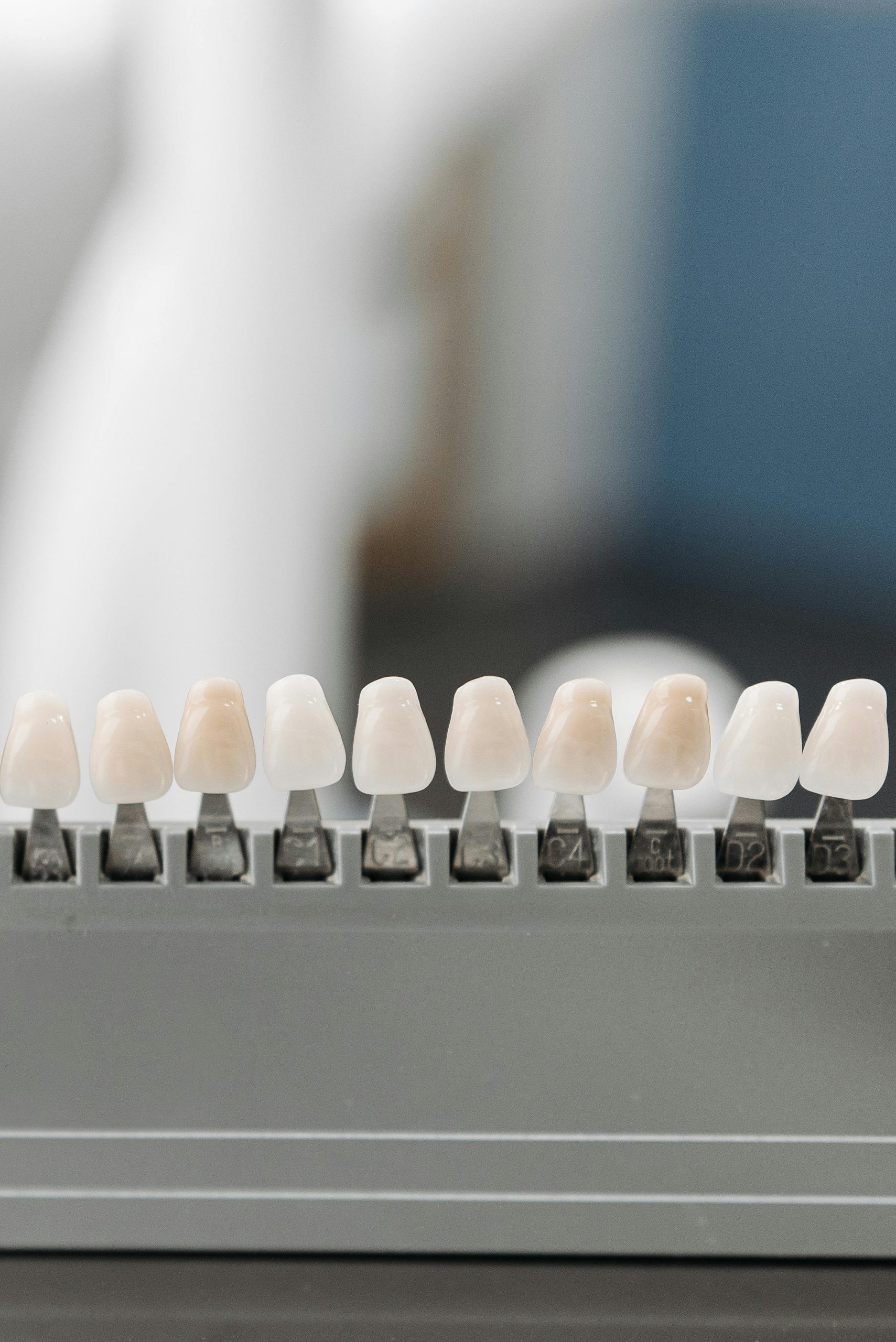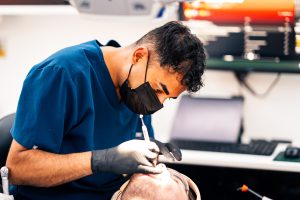What Happens to Your Teeth After Veneers Are Removed?
If you’ve had veneers for several years and are considering removing or replacing them, you might be wondering what your teeth will look like underneath. It’s a common question, especially among patients who’ve seen older veneers start to wear or who want a more natural smile.
The truth is, the condition of your teeth after veneers are removed depends on the type of veneers you have and how they were applied. When performed by an experienced cosmetic dentist, veneer removal can be a safe, straightforward process that keeps your natural teeth healthy and protected.
At Kamran Rasul | The Dental Clinic, we use minimally invasive techniques for both composite and porcelain veneers, ensuring your teeth remain strong, functional, and beautiful – whether you’re keeping, updating, or removing your veneers.
Quick Answer: What Happens to Teeth After Veneers Are Removed?
If veneers are removed, the appearance and health of your teeth depend on the material and how much enamel was prepared. Composite veneers are typically non-invasive and can often be removed with little to no effect on the underlying tooth. Porcelain veneers, which require slight enamel reduction, may leave the teeth looking thinner, rougher, or more sensitive once removed.
At Kamran Rasul | The Dental Clinic, we prioritise preserving your natural enamel, using advanced techniques to restore or replace veneers safely and beautifully.
Why Might Veneers Be Removed?
There are many reasons why a patient might choose to remove or replace their veneers. Veneers are designed to last for years, but like all cosmetic treatments, they can wear down or require updates over time.
Common reasons include:
- Aesthetic changes, such as updating shape, size, or shade
- Damage from chips, cracks, or staining
- Gum recession revealing veneer edges
- Replacing older veneers with new, modern designs
- Choosing to transition from porcelain to composite veneers
Whether you’re refreshing your smile or exploring alternatives, removing veneers doesn’t mean compromising your natural teeth. With proper care, your teeth can remain healthy and functional long after veneer removal.
What Happens to Teeth After Veneers Are Removed?
Veneer removal is a precise process that depends on the type of veneer applied.
Composite Veneers
Composite veneers are applied directly to the surface of your teeth using a tooth-coloured resin. Because this material bonds on top of the enamel, very little – if any – natural tooth structure is altered. When these veneers are removed or replaced, the process involves gentle polishing or abrasion to lift the resin from the tooth.
The result? Your natural enamel remains intact and healthy, often requiring only minor re-polishing or whitening for an even finish.
Porcelain Veneers
Porcelain veneers are slightly different. These thin ceramic shells require small amounts of enamel to be removed before fitting. Once removed, the underlying teeth may feel rough or slightly sensitive. They may appear thinner, less glossy, or more matte in colour because of the enamel reduction.
However, this doesn’t mean your teeth are damaged. The structure beneath remains strong and can be restored with new veneers, composite bonding, or even temporary protective coatings.
In both cases, the key to a healthy result lies in expert removal and aftercare, which is why it’s important to work with a cosmetic dentist experienced in veneer restoration.
Composite vs Porcelain Veneers – The Key Differences
Understanding how composite and porcelain veneers differ helps explain why your teeth may look or feel different after removal.
| Feature | Composite Veneers | Porcelain Veneers |
| Material | Tooth-coloured resin | Ceramic porcelain |
| Preparation | Minimal or no enamel removal | Slight enamel reduction required |
| Durability | 5–7 years | 10–15 years |
| Repairability | Easily repaired or replaced | Requires new veneers if damaged |
| Effect on Teeth | Preserves natural enamel | May slightly alter enamel surface |
At Kamran Rasul | The Dental Clinic, we focus on minimally invasive composite veneer treatments that preserve your natural enamel while achieving stunning cosmetic results. This approach allows for easy updates or safe removal in the future without harming the underlying teeth.
Can Teeth Go Back to Normal After Veneers?
In most cases, yes – especially if you’ve had composite veneers. Because these veneers don’t require extensive enamel removal, your natural teeth can often return to a healthy, normal appearance once the resin is polished away.
If you’ve had porcelain veneers, your teeth might feel more sensitive for a short time after removal, and their appearance may be slightly different due to enamel reduction. However, with professional care, this can be easily corrected through re-veneering, bonding, or whitening.
The important thing is that your natural teeth remain strong and healthy beneath. Veneers enhance appearance but do not replace or weaken the tooth structure when applied properly.
How to Care for Teeth After Veneer Removal
After veneer removal, it’s essential to follow your dentist’s care advice to protect your teeth and enamel. Here are a few tips:
- Brush twice daily with a fluoride toothpaste to strengthen enamel
- Avoid highly acidic foods and drinks for the first few days
- Use a soft-bristled toothbrush to prevent sensitivity
- Schedule a professional polish or fluoride treatment
- Consider whitening or temporary bonding if you wish to restore uniform colour and shine
Your dentist may also recommend a fluoride varnish or mineral-rich toothpaste to reduce sensitivity and protect your enamel.
Replacing or Updating Veneers
Most patients who remove veneers choose to replace them with new ones. Modern veneers are thinner, stronger, and more natural-looking than older styles.
At Kamran Rasul | The Dental Clinic, we offer both composite and porcelain veneer options to suit every need and budget.
- Composite veneers are applied in a single visit, cost £330 per tooth, and require no drilling or injections.
- Porcelain veneers offer long-term durability and a flawless finish, priced at £750 per tooth.
We also provide 0% finance options, making it easy to update or maintain your smile with minimal stress. Whether you’re refreshing your look or starting anew, our tailored treatment plans ensure your results are natural, balanced, and long-lasting.
FAQs: Teeth After Veneers Removed
Are my teeth ruined after veneers are removed?
No. If veneers are removed correctly, your natural teeth remain healthy. Composite veneers are non-invasive, while porcelain veneers may leave the teeth slightly thinner but still strong.
Do teeth look normal after veneer removal?
They may look a little dull or rough at first, but polishing, whitening, or bonding can restore a natural, bright finish.
Are teeth sensitive after veneers are removed?
Some patients experience temporary sensitivity, especially after porcelain veneer removal. This usually settles within a few days.
Can I get new veneers after removing old ones?
Yes. Many patients replace older veneers with new composite or porcelain designs for improved aesthetics and strength.
Is removing veneers painful?
No. The process is comfortable and performed carefully to protect your enamel. Local anaesthetic can be used if necessary, but it’s often not required.
Book a Consultation at Kamran Rasul Dental Clinic
If you’re considering removing or updating your veneers, it’s essential to work with a skilled cosmetic dentist who values precision and tooth preservation.
At Kamran Rasul | The Dental Clinic, we specialise in creating and restoring beautiful, healthy smiles through minimally invasive veneer treatments. Whether you’re transitioning to a new smile or simply exploring your options, our team can guide you every step of the way.
Book your consultation today to discuss veneer removal, replacement, or new smile design options with our experienced cosmetic dentistry team.





